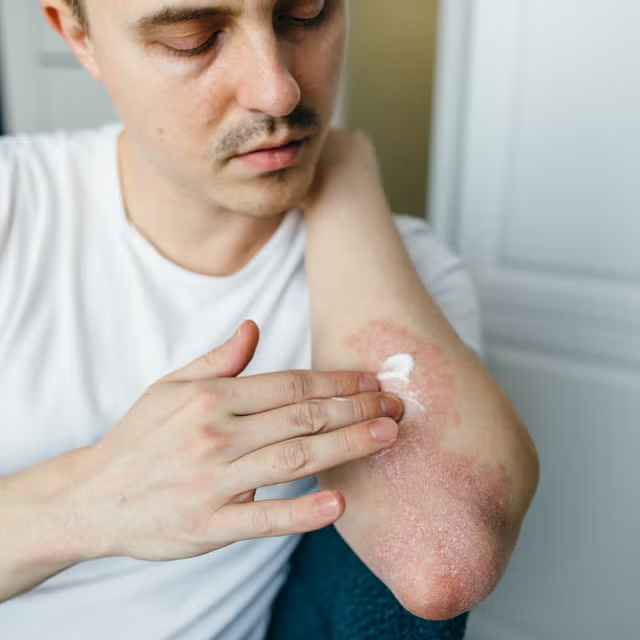
Taking Control Of Psoriasis: Effective Treatment Options
Psoriasis is a chronic autoimmune sickness that affects the skin, causing it to overproduce skin cells. This rapid cell growth leads to the formation of thick, scaly patches that can appear anywhere on the body.
Psoriasis can significantly impact an individual’s quality of life, both physically and emotionally. The appearance of the skin can alter self-esteem and confidence, while manifestation like itching, pain, and joint discomfort can be debilitating.
Understanding Psoriasis
Psoriasis can manifest in various forms, including:
- Plaque psoriasis
The most common type, characterized by raised, red patches covered with silvery-white scales.
- Guttate psoriasis
Sudden onset of small, drop-like lesions, often triggered by infection.
- Inverse psoriasis
Affects skin folds, such as the armpits, groin, and under the breasts.
- Pustular psoriasis
Characterized by pus-filled blisters.
Several factors can trigger psoriasis flare-ups, including stress, infections, injury to the skin, certain medications, and smoking.
Topical Treatments
Topical treatments are applicable directly to the affected skin and are often the first line of defense against mild to moderate psoriasis. These include:
- Corticosteroids
These creams and ointments help reduce inflammation and slow skin cell growth.
- Vitamin D Analogs
These medications help regulate skin cell growth and reduce inflammation.
- Moisturizers
Daily moisturizing is crucial to keep the skin hydrated, prevent dryness and cracking, and improve the effectiveness of other treatments.
- Coal Tar
Coal tar preparations can help slow skin cell growth and reduce inflammation.
Systemic Treatments
For moderate to severe psoriasis, systemic medicine may be necessary. These medications work throughout the entire body:
- Oral Medications
Medications such as methotrexate, cyclosporine, and apremilast can assist slow down the overproduction of skin cells.
- Biologic Medications
These medications target particular parts of the immune system that contribute to psoriasis, effectively reducing inflammation and improving skin clearance.
Light Therapy (Phototherapy)
Light therapy involves advertise the skin to ultraviolet (UV) light:
- UVB Light Therapy
Exposure to UVB light can slow down skin cell growth and reduce inflammation.
- PUVA Therapy
This therapy combines a medication called psoralen with UVA light to increase the skin’s sensitivity to light.
Lifestyle Modifications
Lifestyle modifications can significantly impact psoriasis management:
- Stress Management
Stress can trigger psoriasis flare-ups. Incorporate stress-reducing techniques like yoga, meditation, and relaxation exercises into your daily routine.
- Diet
While no specific diet cures psoriasis, maintaining a healthy diet rich in fruits, vegetables, and whole grains can support overall health and well-being.
- Moisturizing
Regularly moisturize the skin to avoid dryness and cracking, which can worsen psoriasis symptoms.
- Avoidance of Triggers
Identify and avoid subjective triggers, such as stress, infections, and certain medications.
The Importance Of Emotional Well-being
Psoriasis can have a significant impact on emotional well-being. Living with a chronic skin action can affect self-esteem, body image, and social interactions.
- Coping Mechanisms
Develop healthy doing mechanisms for dealing with the emotional challenges of psoriasis, such as talking to a therapist or joining a support group.
- Self-Compassion
Practice self-compassion and self-acceptance. Focus on your strengths and ability rather than dwelling on your skin condition.
- Social Support
Connect with others who understand what you’re going through. Support groups and online communities can give valuable emotional support and practical advice.
By addressing the emotional aspects of psoriasis, you can appreciate your overall quality of life and better cope with the challenges of living with the condition.
The Emotional Impact Of Psoriasis
Psoriasis can have a significant impact on emotional well-being, beyond just the physical symptoms.
- Self-Esteem and Body Image
The visible nature of psoriasis can significantly impact self-esteem and body image. People with psoriasis may feel self-conscious about their appearance, leading to social isolation and anxiety.
- Depression and Anxiety
The emotional distress associated with psoriasis can increase the risk of developing depression and anxiety.
- Social Isolation
Concerns about appearance may lead individuals to avoid social situations, affecting relationships and overall quality of life.
It’s essential to understand and address the emotional impact of psoriasis. Seeking assist from mental health professionals, joining support groups, and practicing self-compassion are essential steps in managing the emotional burden of this condition.
The Role Of Diet In Psoriasis Management
While there’s no single “psoriasis diet” proven to cure the condition, certain dietary approaches may help manage symptoms.
- Anti-inflammatory Foods
Focus on integrating anti-inflammatory foods into your diet, such as fruits, vegetables, whole grains, lean proteins, and healthy fats like omega-3 fatty acids found in fish.
- Limit Processed Foods
Reduce use of processed foods, sugary drinks, and unhealthy fats, as these can accord to inflammation.
- Hydration
Stay hydrated by drinking ample water throughout the day.
The Role Of Alcohol In Psoriasis
Alcohol consumption can have a suggestive impact on psoriasis symptoms.
- Triggers Flare-ups
Alcohol can trigger psoriasis flare-ups in some individuals.
- Interacts with Medications
Alcohol can interact with specific medications used to treat psoriasis, potentially increasing side effects or reducing their effectiveness.
- Dehydration
Alcohol can undermine the body, which can worsen dry, itchy skin, a common symptom of psoriasis.
It’s important to note that temperate alcohol consumption may be acceptable for some individuals, while others may need to abstain completely.
Conclusion
Psoriasis is a chronic action, but with the right cure plan and lifestyle modifications, you can efficiently manage your symptoms and improve your quality of life. Consulting with a dermatologist is key to developing a definite cure plan that best suits your individual needs.
Empowering Yourself: Take Charge Of Your Psoriasis
For further in-depth information on psoriasis, treatment options, and ongoing research, visit the website of the Rajavithi Institute for Clinical Research, a leading institute under Mahidol University: www.rama.mahidol.ac.th. Take control of your psoriasis and live a healthier, happier life!
Frequently Asked Questions
- Is psoriasis contagious?
No, psoriasis is not contagious. It’s an autoimmune disease where the immune system mistakenly attacks healthy skin cells.
- What are some complications of psoriasis?
While psoriasis primarily affects the skin, complications can include psoriatic arthritis, an increased risk of infections, eye problems like psoriatic ophthalmitis, and mental health conditions like depression and anxiety.
- Can stress cause psoriasis or make it worse?
Stress can trigger psoriasis flare-ups as it increases the production of inflammatory chemicals in the body. Managing stress through relaxation techniques like yoga, meditation, or deep breathing exercises can be a valuable tool in managing psoriasis.
- What are some alternative or complementary therapies that may help with psoriasis?
While not a substitute for conventional medical treatment, some alternative or complementary therapies may provide relief from psoriasis symptoms. These include Dead Sea mineral baths, fish oil supplements, and aloe vera. It’s important to consult with a doctor before starting any new therapies.
- Are there any new advancements in psoriasis treatment?
Psoriasis research is ongoing, and new treatment options are constantly emerging. Some promising areas of exploration include biologic medications, gene therapy, and personalized medicine.



